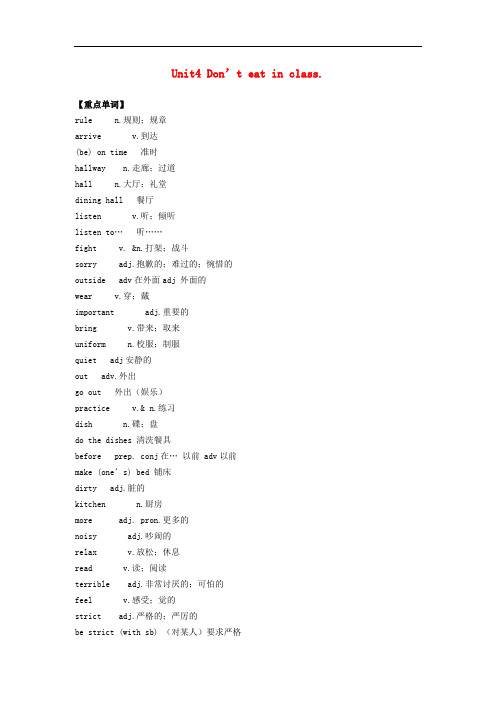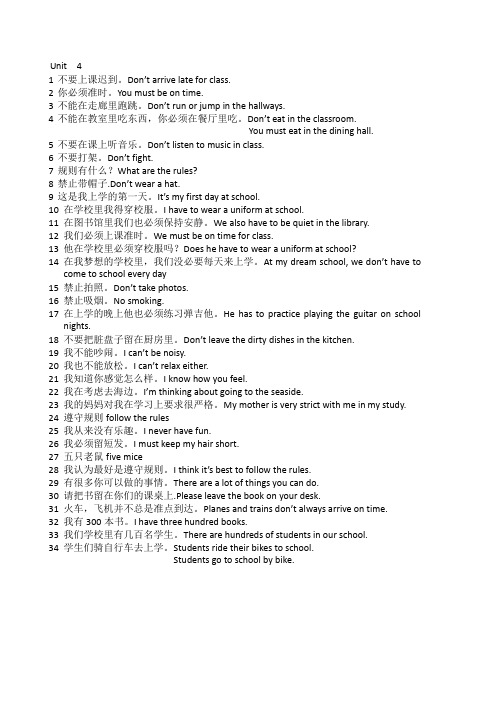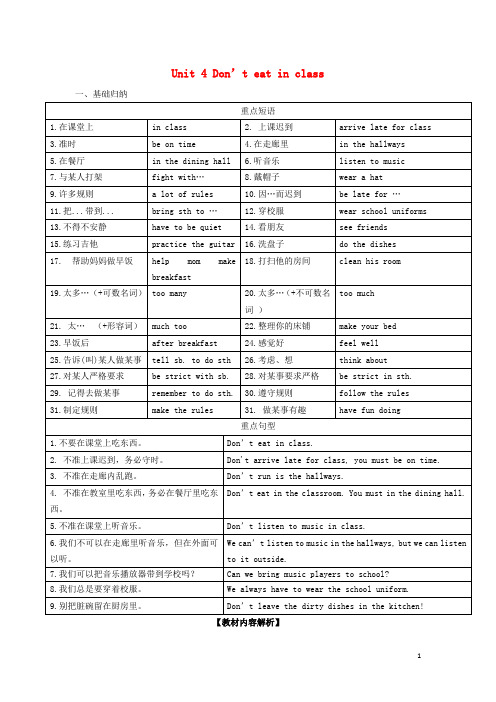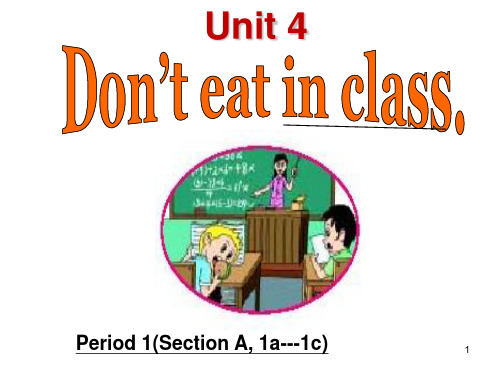【七年级英语下册】 Unit 4 Don't eat in class (新版)人教新目标版
七年级英语下册 Unit 4 Don’t eat in class短语、句型、作文汇总 (新版)人教新目标版

Unit4 Don’t eat in class.【重点单词】rule n.规则;规章arrive v.到达(be) on time 准时hallway n.走廊;过道hall n.大厅;礼堂dining hall 餐厅listen v.听;倾听listen to…听……fight v. &n.打架;战斗sorry adj.抱歉的;难过的;惋惜的outside adv在外面adj 外面的wear v.穿;戴important adj.重要的bring v.带来;取来uniform n.校服;制服quiet adj安静的out adv.外出go out 外出(娱乐)practice v.& n.练习dish n.碟;盘do the dishes 清洗餐具before prep. conj在…以前 adv以前make (one’s) bed 铺床dirty adj.脏的kitchen n.厨房more adj. pron.更多的noisy adj.吵闹的relax v.放松;休息read v.读;阅读terrible adj.非常讨厌的;可怕的feel v.感受;觉的strict adj.严格的;严厉的be strict (with sb) (对某人)要求严格remember v.记住;记起follow v.遵循;跟随follow the rules 遵守规则luck n.幸运;运气keep v.保持;保留hair n.头发;毛发learn v. 学习;学会【重点短语】1. Don’t eat in class 在课堂上2. arrive late for class 上课迟到3. be on time 准时4.in the hallways 在走廊里5.in the dining hall 在餐厅6. listen to music 听音乐7 fight with…与某人打架8.Don’t eat in class. 不要在课堂上吃东西。
七年级下英语Unit 4 Don't eat in class

Unit 4 Don’t eat in class一.单词短语1.wear a hat/uniform/watchIt’s rude to wear a hat in class.Wearing a hat in class will make the teacher really unhappy.二.语法祈使句三.句子1.Don’t arrive late for class. You must be on time.①We can’t arrive late for class. But Mike always arrives late for school.②Don’t forget to call me when you arrive in Xiangyang.What time does she arrive at school?My parents arrive home at 7:00 p.m.2.Don’t run in the hallways. Sorry, Ms. Clark.It’s dangerous to run in the hallways. You may(或许) hurt yourself or other students.3.Don’t eat in the classroom. You must eat in the dining hall.We can’t eat in the classroom, but we can eat outside or in the dining hall.4.Don’t listen to music in class.We must listen to the teacher in class. We can listen to a CD in the music room.Jenny often listens to mp4 on the school bus.5.Don’t fight.=No fighting.We can’t fight with our classmates. It’s wrong to fight with others.6.It’s my first day at school.It’s his first time to study in America.7.This is a great school, but there are a lot of rules.a lot of =lots of +不可数名词或者复数名词We have lots of homework on weekends, but we also have a lot of interesting things to do.8.Don’t be late for class. This is very important.①be late for…He gets up late, so he is often late for work.②“Be on time next time.” The teacher says to him, “This is very important”The teacher says it’s important to be on time.It’s important for the students to follow the school rules.English is an important subject.9.Can we bring music players to school?We can’t go out on school nights.①can用于一般疑问句中,表示询问是否许可或征求意见10.W e always have to wear the school uniform. And we also have to be quiet in the library. At my dream school, we don’t have to come to school every day.I must practice the guitar before dinner and then I have to do the dishes after dinner.I have to help my mother make breakfast every morning.I have to go to bed before 10:00.①have to…We don’t have to wear the school uniform on the weekend.She has to wear a uniform on school days.一般疑问句:Does she have to wear a uniform …? Yes, she does. /No, she doesn’t.变否定句:She doesn’t have to wear a uniform ….对划线部分提问:What does she have to do?②must We must eat in the dining hall.Must we eat in the dining hall? Yes, we must. /No, we don’t have to.(=needn’t情态动词) ●have to 必须, 还有因外界客观条件“迫不得已”之意,must 主观命令等We stay at home because it’s raining outside.As(作为) a student, we study/work hard.●mustn’t语气强硬,绝对禁止,多用于警告危险或原则性事件等We mustn’t swim in the river.③wearShe often wears a red T-shirt(a black watch).She looks beautiful in that white sweater.11.T here are too many rules.too many+ too much+ much too+We have too many rules at school.He has too much bread, so he is much too fat.12.D on’t leave the dirty dishes in the kitchen.①leave+宾语+宾补(介词短语,形容词等)Don’t leave your dirty clothes on the bed.Miss Hu often leaves her phone in the classroom. (区分forget)Don’t leave your homework at home.Leave me alone.②When does she leave Xiangyang for Shenzhen?13.A fter that, I run to school because I can’t be late.Lee gets up late, so he has to run to school.Sky is good at running.14.M y dad says I can’t play basketball after school because I must do my homework.15.A fter dinner, I can’t relax either. I must read a book before I can watch TV.You can watch TV after you read a book(=after reading a book).I can watch TV after doing my homework.She walks to school after(having/eating) breakfast.The boy goes to bed after brushing his teeth(=after he brushes his teeth).16.I know how you feel.①特殊疑问句做宾语从句用陈述语序Please tell me what you think of the book.I want to know how Tom goes to school.②I feel happy this weekend because I have no homework.She feels terrible because she has too much homework.17.t hink aboutLet’s think about the food.18.T here are a lot of things you can do. (定语从句,修饰前面的名词,看懂即可)Can you tell us the subject you like best?19.P arents and school are sometimes strict, but remember, they make rules to help us.①Sometimes, I walk to school.I often ride a bike to school. But sometimes I go to school by bus.②strict be strict with sb. in sth.My mother is very strict with me in my homework.A teacher must be strict with the students in their study. .③I can remember all the new words.Remember to bring your Chinese dictionary to school next week.Tom always remembers to finish his homework on time.④动词不定式表目的He gets to school early to clean the classroom.Lucy makes her bed every day to make her room tidy.20.W e have to follow them.It’s important for the students to follow the school rules.21.M olly must do her homework first when she gets home.get to+地点=arrive at/in+地点When do you get to school(=arrive at school)? What time does she get/arrive home? 22.G ood luck(to you). Wish you good luck.She is lucky to have so many friendly/nice/good friends.23.I must/have to keep my hair short.①keep+adj. 保持某种状态My mother exercises every day to keep healthy.keep+宾语+宾补“使…保持某种状态”We should keep our bedroom tidy and clean.②She is a nice girl with long black hair. She looks beautiful with brown hair.24.I can’t relax on weekends either because I have to learn to play the piano.I want to learn how to ride a bike. Can you teach me how to ride a bike?25.I listen to him because I don’t want the cat to get me.①listen to sb. ①听某人说活②听从某人Tom’s mother asks him not to watch TV, but he doesn’t listen to her.②want sb. to do sth. 想要某人做某事26.I think it’s best to follow the rules.It’s best to do sth…最好做某事It’s best to finish your homework first.。
新人教版七年级初一英语下册Unit_4_Don't_eat_in_class_Section_A

5
SCHOOL RULES
1. Don’t arrive late for class. You must be on time. 2. Don’t run in the hallways. 3. Don’t eat in the classroom. You must eat in the dining hall. 4. Don’t listen to sic in the classrooms or the hallways. 5. Don’t fight.
√ 8. ___ √ fight
2c. Pairwork
A: Can we listen to music, Cindy? B: We can’t listen to music in the hallways, but we can listen to it outside.
2d. Role-play the conversation.
We have to clean the classrooms everyday.
What else do you have to do ?
1. Don’t forget to turn off the light when you leave.
2. Don’t draw on the wall.
3. Don’t watch TV after school . 4. Don’t play football in the street . 5. You must get up early. ……
We can’t rule the country without rules. 没有规章制度就不能治理好国家。
√
can can can can can can can can
新版(人教版)七年级(下)英语Unit4课文详解

Unit 4 Don’t eat in class.Section A 2a—2d ( P20 )* 教师寄语:No rules, no standards. 没有规矩,不成方圆。
【学习目标】【学习重点】:1、学习掌握本节课的生词和短语;2、巩固祈使句的用法;3、学习情态动词can表示许可的肯定句、否定句、一般疑问句及肯定、否定回答。
4、提高学生的听说能力。
【体验学习】:I、预习交流1. 根据音标拼读单词并牢记;2. 自学课文,勾画出重点和疑惑。
II、翻译官1. eat outside ________________2. wear a hat ___________________3. a lot of ___________________4. be late for class_______________5. 不得不__________________6. 穿校服_____________________7. 保持安静________________【课堂导学】:I、新课呈现Step1 RevisionReview the school rules at P19.Step2 PresentationPresent key sentences in this period.This is a great school, but there are a lot of rules.Can we bring music players to school?And we always have to wear the school uniform.And we also have to be quiet in the library.Step3 ListeningListen and finish 2a and 2b. Check the answers.Step4 Pair workTalk about the rules in 2a.Step5 Role-playRole-play the conversation in 2d.II、合作交流Group work: 分析总结情态动词can的用法,并练习造句。
七年级下册英语unit4--Don't-eat-in-class

School Rules
Don’t fight.
Don’t listen to music in the classrooms or the hallways.
Don’t run in the hallways. Don’t arrive late for class.
1a
Write the number of the rule next to the students.
What do you say to him?
Don’t run in the hallways.
2a: Listen. Check( ) the activities Alex and Cindy
talk about .
Activity 1._____ listen to music in the classrooms or hallways. 2._____eat in the classrooms 3._____wear a hat 4._____listen to music outside 5._____fight 6._____listen to music in the music room 7._____ eat in the dinning hall 8._____eat outside can can’t can can can can can can can can’t can’t can’t can’t can’t can’t can’t
人教版英语七年级下册-Unit-4-Don't-eat-in-class-语法解析

2021/2/4
1
6
疑问句: must 提前,回答时注意一二人称的互换。肯定用 must, 否定用needn’t. e.g. --Must I go home now?
-- Yes, you must. -- No, you needn’t.
B: And I must clean my room every Saturday. =?
A: Wow, you do have a lot of rules!
2021Dr. Know, There are too many rules! At 6:00 a.m. my mom says, “Get up now and make your bed!”
too many rules “太多的规定”, 其中too many 用来 修饰可数名词复数rules。 e.g. He has too many friends to meet.
修饰不可数名词时, 要用too much e.g. We have too much work to do.
much too 太……much 用来增强语气。后接形容 词或副词。
What can I do. Dr. Know? Molly Brown, New York
表“看”的单词?
either 也。用于否定句和疑问句中。肯定句中用too 表也。
watch,see,look r,read
2021/2/4
1
13
Dear Molly, I know how you feel. People always tell us, “ Don’t do this!” or “You can’t do that!” But think about it, Molly. There are a lot of things you can do. You can play basketball on weekends. You can watch TV after you read a book. Parents and schools are sometimes strict,
七年级英语下册《Unit4 Don’t eat in class Self check》课件 (新版)人教新目标版

Don’t talk loudly at night.
1. Fill in the blanks with the words in the box.
arrive late listen to be noisy follow the rules be strict
My name is Timmy the Mouse. I must get up early at 6:30 a.m. every morning. Then I have to go to the kitchen to get food for Grandpa. I never arrive late to the kitchen because I have to get there before the cat gets up. My grandpa always tells me I can’t be noisy . I listen to him because I don’t want the cat to get me! My grandpa is strict with me, but I think it’s best to follow the rules !
2. listen / teacher
Listen to the teacher. We must / have to listen to the teacher.
3. be noisy / library
We must not be / can’t be / Don’t be noisy in the library.
ExercisesⅠ. 词汇
1. Speak l______. I can’t hear you. oudly 2. Jack learns the piano in Children’s
初一七年级英语下册人教版Unit 4 Don't eat in class 单元文化背景资料

一,关于规章规章即指规则章程,是规定出来供特定群体的人们共同遵守的制度或章程。
语言文字中规章随场合(正式或非正式)、人物对象、语体(口语或书面语)等不同表现出极强的得体性特征。
另外,不同文化、阶层的人们对规章的认可也是会产生巨大的差异。
因此,规章又表现出极强的地域性和文化性。
英文里规章在书面体和口语语体的语言形式上存在一定的差距,有的时候这种差异还是显而易见的。
试比较:No smoking.(书面体,正式)Don’t smoke in this area.(书面及口语体,正式及命令)You can’t/mustn’t smoke here,sir.(口语体,非正式)You’d better not smoke here, sir. ( 口语体,非正式)或:Would you mind not smoking here,sir?( 口语体,正式且委婉,带有规劝性)二、英文规章的几种表现形式1 图例形式如人们在道路、公共场所常见的“禁左转弯”'“禁止吸烟”等各种图标。
2. 名词性结构大多由“no”、prohibited、free 和zone等构成。
如以下几种“请勿吸烟”的表达方式:No smoking.Smoking strictly prohibited.Smoke Free Zone3.祈使句结构多见于书面张贴,公众告知性的各类规章制度。
如:Arrive on time for school!!Don’t run and play in the classroom.禁止在教室内追逐、打闹。
4.情态动词结构常见于正式或非正式的口语表达:You can,t leave your bike here,sir•先生,此处不可以停放自行车。
Would you move your bike to the wall, please? 请您将自行车挪到墙那边停放好吗?You must wear your school uniforms to school tomorrow.明天大家务必穿校服到校。
新版七年英语下册Unit 4 Don't eat in class.重点句子汉英英汉

1不要上课迟到。
Don’t arrive late for class.2你必须准时。
You must be on time.3不能在走廊里跑跳。
Don’t run or jump in the hallways.4不能在教室里吃东西,你必须在餐厅里吃。
Don’t eat in the classroom.You must eat in the dining hall.5不要在课上听音乐。
Don’t listen to music in class.6不要打架。
Don’t fight.7规则有什么?What are the rules?8禁止带帽子.Don’t wear a hat.9这是我上学的第一天。
It’s my first day at school.10在学校里我得穿校服。
I have to wear a uniform at school.11在图书馆里我们也必须保持安静。
We also have to be quiet in the library.12我们必须上课准时。
We must be on time for class.13他在学校里必须穿校服吗?Does he have to wear a uniform at school?14在我梦想的学校里,我们没必要每天来上学。
At my dream school, we don’t have to come to school every day15禁止拍照。
Don’t take photos.16禁止吸烟。
No smoking.17在上学的晚上他也必须练习弹吉他。
He has to practice playing the guitar on school nights.18不要把脏盘子留在厨房里。
Don’t leave the dirty dishes in the kitchen.19我不能吵闹。
I can’t be noisy.20我也不能放松。
2024年春七年级英语下册Unit4Don’teatinclass单元分析教案新版人教新目标版

Unit 4 Don't eat inclassSection A本单元以“规章制度”为话题,用祈使句、情态动词can, must, have to谈论班规、校规及家规。
Section A部分通过教室外墙壁张贴校规的形式呈现书面语的规章制度,然后通过听、说、读、写来学习规章制度的表达方法。
Section B部分通过Molly Brown的苦恼,介绍有关“家规”的内容,并引导学生正视“家规、校规”,使他们相识到:Teachers and parents make rules to help us. We have to follow them.1.Don't eat in the classroom.2.We can't arrive late for class.3.We must be on time.4.—Can we wear a hat in class?—Yes, we can./No, we can't.5.We have to clean the classroom.6.We have to follow the rules.1.祈使句的否定句用法 (详见P 语法聚焦)2.情态动词can表示“许可”的用法及have to的句型结构。
Some school rules in America1.If someone bumps into you, say excuse me, even if it was not your fault.别人碰撞到你,不管你有没有错都要说“对不起”。
2.Be positive and enjoy life.要乐观,要享受人生。
3.Live so that you will never have regrets.别让将来有缺憾。
4.No matter the circumstances, always be honest.不管环境如何,肯定要诚恳。
七年级英语下册-Unit-4-Don‘t-eat-in-class教案-(新版)人教新目标版

Unit 12 Don’t eat in class.I.教学设计分析本单元的中心话题是rules,主要语言功能是谈论并制定某些规章制度,如校规、班规和家规。
语言结构为祈使句。
利用情态动词can, must, have to 来谈论一些规章制度。
在Section A里通过活动与图片的配对,引出本部分中关于“学校的规章制度”及否定祈使句。
主要训练学生的听、说、演及其归纳总结的水平。
Section B主要通过一系列的句式进一步训练目标语言,并注意have to与 must, can与can’t的用法。
最后是要能使用所学的知识去制定一定的规则。
New languages:1.- Don’t run in the hallways. Don’t fight.2.-What are the rules? We must be on time for class.3.-Can we eat in the classroom?-No, we can’t, but we can eat in the dining hall.4.-Can we wear a hat in class? Yes, we can./ No, we can’t.5. - Does he have to wear a uniform at school?-Yes, he does. / No, he doesn’t.6. What do you have to do? We have to be quiet in the library.II. 教学学时分配Teaching periods:Period 1: Section A 1a -1cPeriod 2: Section A 2a -2cPeriod 3: Grammar Focus/ 3a -3cPeriod 4: Section B 1b -1fPeriod 5: Section B 2a-3c and self checkPeriod 6: Review Unit 1Unit 4 Don’t eat in class.Section A (1a-1c)1.Master the key words:rules, hallway, classroom, Mrs. fight, school rules.Master the sentences: 1). Don’t eat in class.2).You must be on time.3). Eat in the dining hall.2.Talk about the school rules.3.Listening and speaking skills and communicative competence.4. Encourage students to talk about the rules.5. To help Ss use the target language in natural speech.II. Key points1. Talk about the school rules and the target language.2. Learn to talk about the school rules.3. Imperatives Don’t...Difficult point:1. Talk about the school rules and the target language.2. Learn to talk about the school rules.III. Teaching aidsMultimedia/A tape recorder/A blackboardIV. Teaching proceduresStep1 Leading-inWarming-upT:What’s the woman doing? S: Sh e’s eating.T: Where is she eating? S: Sh e’s eating in class.T:Can you eat in class? S: No, we can’t.T: So please don’t eat in class.(= You can’t eat in class.)…Step 2 Presention1. T: Now, Look at the picture on your textbook. Each of the students is breaking one ofthese rules.Please finish 1a.1. Don’t arrive late for class. You must be on time.2. Don’t run in the hallways.3. Don’t eat in the classroom. You must eat in the dining hall.4. Don’t listen to music in class.5. Don’t fight.2. Listening1). T: Now let’s listen! What rules are these students breaking? Write the numbers after names?Peter ______ Amy ______ Mike ______2). Check the answers:3). Listen again and complete the conversation.Ms. Clark: Hey, Peter. You know the rules. Don’t _________________.Peter: Sorry, Ms. Clark.Mr. Smith: Amy, don’t _______________________.Amy: Oh, sorry, Mr. Smith.Mr. Smit h: Hey, Mike, don’t ______________ in class. Mike!Boy: He can’t hear you, Mr. Smith.Step3 ConsolidationPair workS.A is a new student. S.B is telling S.A about the school rules.Ask students to practice the conversation and make their own conversations.Ss work in pairs and practice saying the school rules.A: What are the rules?B: Well, we can’t arrive late for class. We must be on time.…Step 4 Summary1. Words: rules, arrive, late, hall, dinning hall, listen, listen to, fight, sorry Phrases: on time listen to… arrive/be late forSentences: 1. Don’t arrive late for class.You must be on time.2. Don’t run in the hallways.3. Don’t eat in the classroom. You must eat in the dining hall.4. Don’t listen to music in class.5. Don’t fight.2. Assign homework:1). Copy the new words (5E, 1C).2). Try to remember the words and expressions and use them freely.3). Write the rules in your school with“Don’t …. We can’t.... We must...”. V. Blackboard designUnit 4 Don’t eat in class.Section A1. Don’t arrive late for class.You must be on time.2. Don’t run in the hallways.3. Don’t eat in the classroom. You must eat in the d ining hall.4. Don’t listen to music in cla ss.5. Don’t fight.Teaching reflection:。
人教版新目标英语七年级下册:Unit 4 《Don't eat in class》

Unit4 Don’t eat in class!附参考答案一.单项选择.1.____ late. It’s your first day to work.A. Don’t to beB. Don’t beC. Don’tD. No 2.-______sing! -All right.A. LetB. Let’sC. We let3.When will the train ______?A. arriveB. arrive atC. reachD. arrive in4.I ______ but I _______ nothing.A. listened ; heardB. listened; hearC. heard; heardD. heard; listened5.The girl ______ the red dress is Jill Green.A. withB. wearC. put onD. in6.-Do you have an eraser?-______. I have _______ eraser.A. No; notB. Not; noC. No; noD. Not; not7. Mary usually _____ her dog at weekend.A. walkB. takesC. go withD. walks8. Don’t ______ bed by 9 o’clock.A. goB. inC. be inD. go in9. We can’t go out _______ school nights.A. atB. inC. onD. by10. He can’t meet his friends tonight because he _______ do homework.A. has toB. needC. have toD. don’t have to11. It’s very warm. You ______ to wear the coat.A. mustB. d on’t have toC. have toD. mustn’t12. Don’t go into the classroom _______ the teacher.A. withB. togetherC. withoutD. with not13. He can’t _______, but he often _______ to the beach and play.A. swimming, goB. swim, goesC. swims, goesD.swim, go14. Does she always wear _______?A. uniformB. sneakerC. a uniformD. a sneaker15. There are ________ rules in our class.A. many tooB. too muchC. much tooD. too many16. Tom never ________ fun at home.A. have muchB. has anyC. have anyD. has many二.句型转换。
2020七年级英语下册 Unit 4 Don’t eat in class短语、语法知识点汇总 (新版)人教新目标版

Unit 4 Don’t eat in class 一、基础归纳【教材内容解析】Section A1.Don’t arrive late for class. (P. 19)arrive作不及物动词,表示“到达”,接宾语时,需要加上介词in或者at。
When did you arrive?We are arriving at the station at two o’clock.【拓展】reach表示“到达”时,是及物动词,后面直接接表示地点的名词作宾语。
另外两个表示“到达”的动词(get和arrive)都是不及物动词,get to+地点;arrive in/at+地点。
After a long way, they reached/got to/arrived at the top of the mountain finally.2.You must be on time. (P. 19)on time用作固定短语,表示“准时、按时”,in time表示“及时”。
The train arrives on time.The ambulance(救护车) arrives in time.3.Don’t listen to music in class. (P. 19)listen用作不及物动词,表示听的动作,后接宾语时,需要加上介词to,hear强调听的结果,表示“听到”。
This girl likes to listen to music.Can you hear anything?4.Don’t fight. (P. 19)fight此处用作动词,意为“打架”,fight with sb.意为“与某人打架”。
Why do you sometimes fight with others?5.listen to music outside (P. 20)outside表示“在外边”,反义词为inside“在……里面”。
初中英语 七年级下册 Unit4 Don't eat in class

(2)意为“一定;准是”,表示肯定推 测,用于肯定句中。 这本书一定是玛丽的。
The book must be Mary’s.
2.情态动词 have to 的用法 (1) have to 意为“必须;不得不”,后接动词 原形,表示客观需要做的事情。 现在我不得不离开。 I have to leave now.
不要吵闹。 Don’t be noisy.
肯定句:
让我帮你吧。
Let+宾语+动词原形+其他. Let me help you.
Let 型 否定句:
①Don’t let+宾语+动词原 形+其他. ②Let+宾语+not+动词原 形+其他.
别让他走。
Don’t let him go./
Let him not go.
2.祈使句的句式
肯定句:
请坐。
动词原形(+宾语)+其他. Sit down, please.
Do
型 否定句:
不要在这儿跑。
Don’t +动词原形(+宾语)
+其他.
Don’t run here.
肯定句: Be +表语+其他. Be 型 否定句: Don’t + be +表语+其他.
请安静。 Be quiet, please.
Summary
语法 1. 祈使句的三种类型用法
Don’t run in the hallway. 2. 情态动词can, must, have to的用法
Can we wear a hat in class? We must be on time for class. We have to be quiet in the library.
新版新目标英语七年级下unit4--Don't-eat-in-classPPT课件

Don’t listen to music in class.
.
11
Can you fight in school?No, we can’t.
Don’t fight .
.
12
Words &Expressions on Page 19
• rule n. 规则;规章
• arrive v. 到达
permission. • Get the Ss to know what they can do and what they
can’t do. • Have the Ss learn how to expore sth by group work. • Get the Ss to know wesern culture about schools.
3
4
2. Don’t run in the hallways.
Don’t run in the hallways.
3. Don’t eat in the classroom. You must eat in the dining hall.
4. Don’t listen to music in class.
• ( be )on time 准时
• hall n. 大厅;礼堂
• hallway n. 走廊
• dining hall 餐厅
• listen v. 听;倾听
• listen to... 听.......
• fight v. & n. 打架;战斗
• sorry adj. 抱歉的;难过的;惋惜的
13
Don’t+动词原形+其他.(,please.)
七年级英语下册Unit-4-Don't-eat-in-class知识点总结

Unit 4 Don’t eat in class一、重点词组及短语1。
school rules 学校规章制度17。
share (sth.)with sb。
和某人分享2. break the rules 违反规章制度18. make (up)ruler 制订规则3。
fallow/keep the rules 遵守规章制度19。
learn to do sth. 学(做某事)4. arrive late for class = be late for class20. on school days在上学期间上课迟到5。
dining hall饭厅,餐厅21。
on school nights在校期间的晚上6。
in class 在课堂上22. practice (playing) the piano 练习弹钢琴7。
on time准时(in time及时)23。
go out外出8. eat in the classroom 在教室里吃东西24. see friends看望朋友9. wear a hat (hats) 戴帽子25. clean (one’s)room打扫房间10。
listen to music 听音乐26. do the dishes洗餐具11。
school uniforms校服27. too many/much太多的(可数/不可数)12。
wear uniforms穿制服28。
make (one’s) bed铺床13。
I see我明白了29. go to bed去睡觉(be in bed 在床上)14. have to do sth。
不得不做30. think about=think of 考虑、认为15。
be(keep)quiet保持安静31. be strict (with sb.)对某人)要求严格16。
according to根据,依据32. Don’t talk. = No talking.不要说话二、知识点解析1. Don’t fight. 不要打架.fight作动词,意为“打架、打仗”。
- 1、下载文档前请自行甄别文档内容的完整性,平台不提供额外的编辑、内容补充、找答案等附加服务。
- 2、"仅部分预览"的文档,不可在线预览部分如存在完整性等问题,可反馈申请退款(可完整预览的文档不适用该条件!)。
- 3、如文档侵犯您的权益,请联系客服反馈,我们会尽快为您处理(人工客服工作时间:9:00-18:30)。
Unit 4 Don't eat in class.Section A (1a-2d)一、教学目标:1. 语言知识目标:1) 能掌握以下单词:rules, arrive, late, hall, dinning hall, listen, listen to, fight, sorry2) 能掌握以下句型:① Don't eat in class.② You must be on time.③ Eat in the dining hall.2. 学会用英语表达一些标志的含义。
3. 熟练使用目标语言谈论对某些规章制度(校规、家规等)的看法3. 情感态度价值观目标:能用英语表达和制定一些简单的规则,理解没有规矩不成方圆;无论是在学校时还是在家庭中以及以后走上社会都应当遵守规则,按规则办事。
二、教学重难点1. 教学重点:1) 肯定祈使句是省略掉主语的原形动词开头;2) 否定祈使句则是在肯定祈使句前加上“don’t”。
3) 情态动词must及have to在用法上的区别。
2. 教学难点:掌握祈使句的用法,并能听懂、会说一些简单的祈使句。
三、教学过程Ⅰ. Warming-up and revision教师进教室后,使用祈使句请学生们完成一系列动作:Please stand up/ sit down. Close the door, please. Look at me and listen to me. Don’t open your books. Don’t talk. Let’s begin our class.学生听教师的指令完成各种动作,教师也可将指令写到黑板上,让学生从视觉上考察祈使句的特点。
Ⅱ. Presentation教师出示书上1a 的图片,向学生提问。
指着图上奔跑的男孩提问T:What’s the boy doing? S: He’s running.T: Where is he running? S: He’s running in the hallways.(板书,教读)T:Can you run in the hallways? S: No, I can’t.T: So please don’t run in the hallways.(板书,教读)(= You can’t run in the hallways.)学生跟读数遍,明白祈使句和“can”的表达含意。
T:Why is he running in the hallways? S: He’s late.T: Oh, he’s late for class.(板书,教读)You can’t arrive late for class.(板书,教书) = Don’t arrive late for class.…Ⅲ. 1aT: Now, Look at the picture on your textbook. Each of the students is breaking one of these rules.Please finish 1a.学生看图,完成1a的内容,检查答案并大声朗读校规。
Ⅳ. Listening1. T: Now let’s listen! What rules are these students breaking? Write the numbers after names?2. 学生们听录音,完成1b,选出四位学生都违反了哪条校规;听之前,学生要读会英文名。
3. Check the answers:Ⅴ. Pair work请两位学生朗读1c部分的句型;要求学生两人一组对话表演,SA扮演外校转来新生,SB告知本校校规。
(学生可经过讨论,多说出他们想到的校规,不必只限于书上;教师应给予帮助)Ⅵ. Listening1. Work on 2a:First, let's read the sentences in 2a together.T: Now, let's listen to the recording. Check the activities Alan and Cindy talk about. Ss listen to the recording and check the activities they hear.Play the recording again for the Ss to check the answers.2. Work on 2b:Make Sure Ss know what they should do.Listen to the recording again. Can Alan and Cindy do these activities? Circle can or can't above.3. Check the answers:Ⅶ. Pair work1. Suppose you are Alan and your partner is Cindy. Talk about the rules in 2a.2. Let some students come to the front and act out the conversations.Ⅷ. Role-play1. Read the conversation and find some rules in this school?2. Ss read the conversations and find the answers to this question.3. Check the answers:( Don't be late for school. Don't bring music players to school. You always have to wear the school uniform. You have to be quiet in the library. )Homework:1. Remember the new words and expressions.2. 完成下列句型转换试题1)I can play computer games on weekends.(一般疑问句)_________________________________? Yes, ____________.2) He has to wear uniform.(变否定句)He _____ _____ _____ wear uniform.3) I have to wear sneakers for gym class.(一般疑问句)_____ you ____ ____ wear sneakers for gym class? Yes, I ____.4) They have to wash clothes.(提问) ____ do they have ____ ____?5)You can’t go out on school nights.(换一种表达) _______ go out on school nights. 6)Don’t talk in class.(同上) No _________.板书设计:Section A (Grammar Focus-3c)一、教学目标:1. 语言知识目标:1) 继续练习运用如何做自我介绍及问候他人。
学会从对话中获取对方的基本信息(询问他人姓名)。
能掌握以下句型:① Don't eat in class.② You must be on time.③ Eat in the dining hall.2. 情感态度价值观目标:该部分继续学习使用目标语言谈论对某些规章制度(校规、家规等)的看法。
二、教学重难点1. 教学重点:1) 继续学习使用目标语言谈论对某些规章制度(校规、家规等)的看法2) 通过不同方式的练习方式来学会用英语表达一些标志的含义。
3) 运用祈使句来表达一些规章和制度。
2. 教学难点:1) 总结用祈使句、情态动词can、must及have to来表达各种规章制度;2) 能用所学的知识来制定一些简单的规章制度。
三、教学过程Ⅰ. Warming- up and revision1. Greet the Ss as usual.2. Check the homework.Ⅱ. Grammar Foc us.1. 学生阅读Grammar Focus中的句子,然后做填空练习。
① 不要在楼道里跑。
_______________________② 不要打架。
____________________③ 有什么规则? ___________________④ 我们必须按时上课。
____________________⑤ 我们可以在教室里吃东西吗?____________________⑥ 不能。
但我们可以在餐厅里吃东西。
___________________⑦ 我们可以在教室里带帽子吗?____________________…2. Ss finish off the sentences and check the answers by themselves.3. Give eight more minutes for the Ss to remember the sentences.Ⅲ. Writing1. Look at 3a. Do you know the meaning of these pictures? Yeah, you see them in the school library. Can you write the rules for the school library?2. Ss discuss the pictures and make some rules.3. Let some Ss read their rules aloud.4. Check the answers with the class.(Don't listen to music in the library. Don't eat or drink in the library. Don't take photos in the library. )Ⅳ. PracticeWork on 3b:1. T: Use the words to make questions about the rules. Then write answers according to your school. For example:Be quiet? (she/have to/ in the library)Does she have to be quiet in the library?Yes, she does.2. 注意: have to虽是情态动词,但其在句子中与谓语动词共同构成句子时,其一般疑问句应用助动词do或does来帮助构成;而情态动词can则直接提前构成一般疑问句式。
